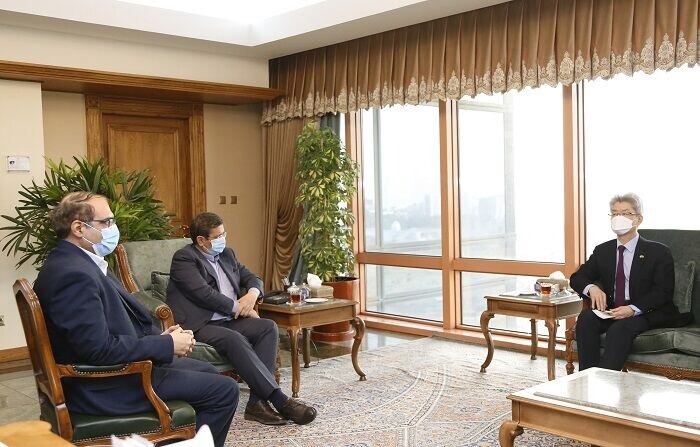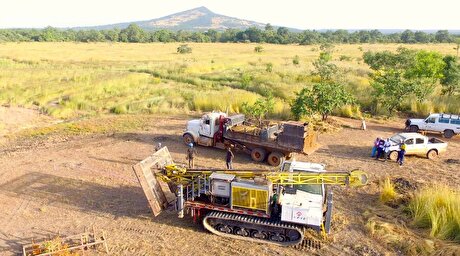
Iran, S. Korea discuss details about transferring frozen funds

As reported by IRNA, in the meeting which was held on the invitation of the South Korean embassy, the two sides negotiated the ways and protocols for allocating a part of Iranian funds in South Korea for purchasing essential goods from third countries.
Hemmati, in this meeting, presented CBI’s demands regarding the volume of funds and the names of the foreign banks to which the money should be transferred.
Ryu Jeong-Hyun for his part expressed his country’s readiness for taking all the necessary measures for ensuring the transfer of the mentioned funds to the destination banks.
According to CBI, over seven billion dollars of Iranian oil revenues have been frozen in two South Korean banks since September 2019, when Washington's sanctions waiver for South Korea's imports of Iranian oil expired.
Iran has repeatedly called on Seoul to abandon its “illegal” policies and release the Iranian assets that it has frozen due to the U.S. sanctions so that Tehran can step up its fight against COVID-19.
Earlier, President Hassan Rouhani had reacted to Seoul’s blocking of Iranian assets, saying: “South Korea’s ban on Iran’s use of its central bank resources to buy basic goods, medicine, and humanitarian data-x-items is by no means acceptable, and we expect Seoul to lift this restriction as soon as possible.”
Following the intensification of disputes between the two sides, South Korean Vice Foreign Affairs Minister Choi Jong Kun visited Iran in January and met with senior Iranian officials including the CBI governor for discussing ways for resolving the issue.
In the meeting with Choi, Hemmati called on the South Korean government to take an independent approach towards the issue of releasing Iran's resources in the country, saying: "Seven billion dollars belonging to the Iranian nation has been blocked in South Korean banks for more than two years, this is unacceptable and Iran definitely will not be indifferent towards this issue.”
Referring to a previous visit to Seoul, Hemmati said: "A year and a half ago, I had talks with South Korean officials, including the Deputy Prime Minister and Minister of Economy, about this issue, and they promised assistance and cooperation, which unfortunately were not realized."
After the Korean official’s visit to Iran, the two sides finally agreed that South Korea should provide the necessary monetary channels for Iran to be able to use its assets in this country for purchasing essentials goods through third countries.


Eldorado to kick off $1B Skouries mine production in early 2026

Newmont nets $100M payment related Akyem mine sale

First Quantum scores $1B streaming deal with Royal Gold

Caterpillar sees US tariff hit of up to $1.5 billion this year

Copper price collapses by 20% as US excludes refined metal from tariffs

Gold price rebounds nearly 2% on US payrolls data

St Augustine PFS confirms ‘world-class’ potential of Kingking project with $4.2B value

B2Gold gets Mali nod to start underground mining at Fekola

Copper price posts second weekly drop after Trump’s tariff surprise

NextSource soars on Mitsubishi Chemical offtake deal

Copper price slips as unwinding of tariff trade boosts LME stockpiles

SAIL Bhilai Steel relies on Danieli proprietary technology to expand plate mill portfolio to higher steel grades

Alba Discloses its Financial Results for the Second Quarter and H1 of 2025

Australia weighs price floor for critical minerals, boosting rare earth miners

Australia pledges $87M to rescue Trafigura’s Nyrstar smelters in critical minerals push

Fresnillo lifts gold forecast on strong first-half surge

Why did copper escape US tariffs when aluminum did not?

Fortuna rises on improved resource estimate for Senegal gold project

Caterpillar sees US tariff hit of up to $1.5 billion this year

NextSource soars on Mitsubishi Chemical offtake deal

Copper price slips as unwinding of tariff trade boosts LME stockpiles

SAIL Bhilai Steel relies on Danieli proprietary technology to expand plate mill portfolio to higher steel grades

Alba Discloses its Financial Results for the Second Quarter and H1 of 2025

Australia weighs price floor for critical minerals, boosting rare earth miners

Australia pledges $87M to rescue Trafigura’s Nyrstar smelters in critical minerals push

Fresnillo lifts gold forecast on strong first-half surge

Why did copper escape US tariffs when aluminum did not?

Fortuna rises on improved resource estimate for Senegal gold project














